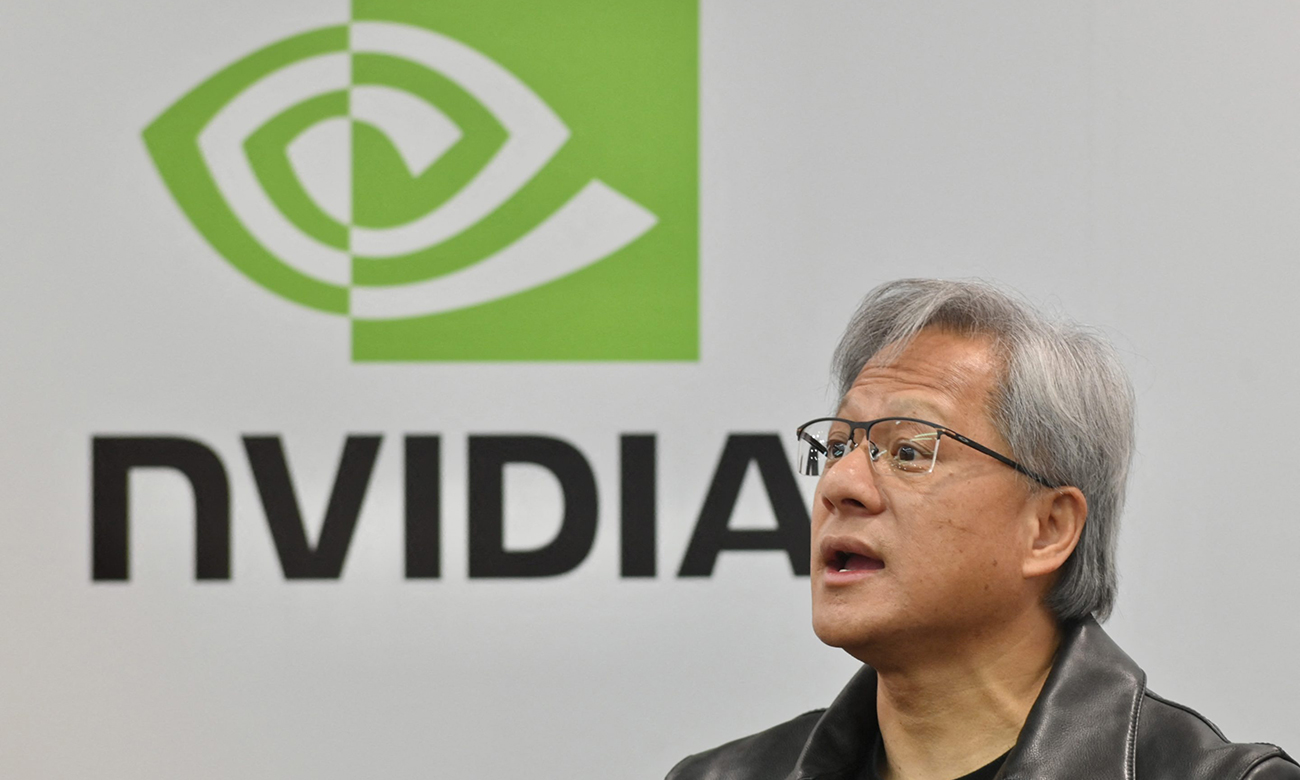
英伟达(Nvidia)股价大涨,使其在今年成为全球最有价值的公司之一。虽然这家科技公司大获成功,但其联合创始人兼CEO黄仁勋却态度坚定地表示,如果有重来一次的机会,他不会选择创业。
60岁的黄仁勋接受了播客《Acquired》的采访,采访的话题广泛。这期播客在上周发布。在采访中,他被问到如果重新回到30多岁的年纪,他会考虑创建一家什么样的公司。
黄仁勋不假思索地回答道:“我不会创业。”
他补充道如果有机会重来,他拒绝选择从零开始创建一家公司的理由,“非常简单”,那就是创业过程会令人精疲力尽。
他表示:“创建英伟达的艰难程度远远超出我的预期,甚至已超出了任何人的预期。如果我们能意识到在创业过程中,你会遭遇的痛苦和折磨,你会感到自己多么脆弱,你要忍受的挑战、尴尬和羞耻,以及你会犯下的所有错误,我认为不会有任何人想要创建一家公司。只要是脑袋正常的人都不会选择创业。”
英伟达跌宕起伏的成功过程
毕业于斯坦福大学(Stanford)的黄仁勋在1993年参与创建了英伟达,生产在数据中心、自动驾驶汽车和游戏设备中使用的计算机处理器,而且他将这家公司发展成全世界最有价值的上市公司之一。
2023年,对人工智能的需求大幅增长,使英伟达迎来了一次股价暴涨。英伟达的收益超出了华尔街的预期,而且黄仁勋公开宣布看好人工智能。
今年迄今为止,英伟达股票上涨约190%,这让它进入了万亿美元估值精英俱乐部,其中还包括苹果(Apple)、微软(Microsoft)、沙特阿美(Saudi Aramco)和谷歌(Google)母公司Alphabet。
公司的成功给黄仁勋个人带来了巨大回报,据彭博社的实时亿万富翁财富跟踪系统显示,黄仁勋目前的资产净值约为370亿美元。这让他排在全球富豪榜的第31位。
但对于黄仁勋和英伟达而言,过去数十年并非一帆风顺。
1995年,英伟达的第一款芯片NV1未能吸引付费客户,导致公司一度濒临破产。当时成立仅两年的英伟达不得不裁掉了一半员工。其1997年发布的第三款芯片RIVA 128大获成功,改变了公司的命运。
最近,在2022年,公司面对令人失望的收益指引,不得不减缓招聘和削减开支。
去年,面对大西洋两岸各国监管机构的不断施压,英伟达以400亿美元收购芯片设计公司ARM的交易以失败告终,而且公司还因为其加密货币挖矿活动的信息披露问题遭到美国证券交易委员会(U.S. Securities and Exchange Commission,SEC)的指控。英伟达以550万美元,与美国证券交易委员会就后者达成了和解。
黄仁勋对《Acquired》播客的主持人本·吉尔伯特和大卫·罗森塔尔表示,“创业者的超能力”实际上是他们对领导一家公司的艰难程度的无知。
他说道:“他们不知道创业的过程是多么艰难——他们只能问自己:‘创业能有多难’?到目前为止,我还在想:‘创业能有多难?’,以此来欺骗自己的大脑。因为你不得不这样做。你必须让自己相信创业过程并不难,因为它实际上要比你想象的更加艰难。”
黄仁勋补充道,他在职业生涯中积累的经验,足以让他在时间倒流的时候,打消创业的念头。
他说道:“如果我带着现在的所有知识重回过去,我还说:‘我要再次忍受整个过程’……我认为这太过分了。真的很过分。”(财富中文网)
翻译:刘进龙
审校:汪皓
英伟达(Nvidia)股价大涨,使其在今年成为全球最有价值的公司之一。虽然这家科技公司大获成功,但其联合创始人兼CEO黄仁勋却态度坚定地表示,如果有重来一次的机会,他不会选择创业。
60岁的黄仁勋接受了播客《Acquired》的采访,采访的话题广泛。这期播客在上周发布。在采访中,他被问到如果重新回到30多岁的年纪,他会考虑创建一家什么样的公司。
黄仁勋不假思索地回答道:“我不会创业。”
他补充道如果有机会重来,他拒绝选择从零开始创建一家公司的理由,“非常简单”,那就是创业过程会令人精疲力尽。
他表示:“创建英伟达的艰难程度远远超出我的预期,甚至已超出了任何人的预期。如果我们能意识到在创业过程中,你会遭遇的痛苦和折磨,你会感到自己多么脆弱,你要忍受的挑战、尴尬和羞耻,以及你会犯下的所有错误,我认为不会有任何人想要创建一家公司。只要是脑袋正常的人都不会选择创业。”
英伟达跌宕起伏的成功过程
毕业于斯坦福大学(Stanford)的黄仁勋在1993年参与创建了英伟达,生产在数据中心、自动驾驶汽车和游戏设备中使用的计算机处理器,而且他将这家公司发展成全世界最有价值的上市公司之一。
2023年,对人工智能的需求大幅增长,使英伟达迎来了一次股价暴涨。英伟达的收益超出了华尔街的预期,而且黄仁勋公开宣布看好人工智能。
今年迄今为止,英伟达股票上涨约190%,这让它进入了万亿美元估值精英俱乐部,其中还包括苹果(Apple)、微软(Microsoft)、沙特阿美(Saudi Aramco)和谷歌(Google)母公司Alphabet。
公司的成功给黄仁勋个人带来了巨大回报,据彭博社的实时亿万富翁财富跟踪系统显示,黄仁勋目前的资产净值约为370亿美元。这让他排在全球富豪榜的第31位。
但对于黄仁勋和英伟达而言,过去数十年并非一帆风顺。
1995年,英伟达的第一款芯片NV1未能吸引付费客户,导致公司一度濒临破产。当时成立仅两年的英伟达不得不裁掉了一半员工。其1997年发布的第三款芯片RIVA 128大获成功,改变了公司的命运。
最近,在2022年,公司面对令人失望的收益指引,不得不减缓招聘和削减开支。
去年,面对大西洋两岸各国监管机构的不断施压,英伟达以400亿美元收购芯片设计公司ARM的交易以失败告终,而且公司还因为其加密货币挖矿活动的信息披露问题遭到美国证券交易委员会(U.S. Securities and Exchange Commission,SEC)的指控。英伟达以550万美元,与美国证券交易委员会就后者达成了和解。
黄仁勋对《Acquired》播客的主持人本·吉尔伯特和大卫·罗森塔尔表示,“创业者的超能力”实际上是他们对领导一家公司的艰难程度的无知。
他说道:“他们不知道创业的过程是多么艰难——他们只能问自己:‘创业能有多难’?到目前为止,我还在想:‘创业能有多难?’,以此来欺骗自己的大脑。因为你不得不这样做。你必须让自己相信创业过程并不难,因为它实际上要比你想象的更加艰难。”
黄仁勋补充道,他在职业生涯中积累的经验,足以让他在时间倒流的时候,打消创业的念头。
他说道:“如果我带着现在的所有知识重回过去,我还说:‘我要再次忍受整个过程’……我认为这太过分了。真的很过分。”(财富中文网)
翻译:刘进龙
审校:汪皓
Nvidia’s major stock rally has seen it become one of the world’s most valuable companies this year—but in spite of its success, the tech firm’s cofounder and CEO, Jensen Huang, is adamant he wouldn’t start the business if he was given his time again.
During a wide-ranging interview with the Acquired podcast that was published last week, Huang, 60, was asked what sort of company he would think about starting if he could go back to being 30 years old.
“I wouldn’t do it,” was Huang’s immediate answer.
His reason for rejecting the option to build a company from the ground up if he could have a do-over was “quite simple,” he added: It’s just too grueling.
“Building Nvidia turned out to have been a million times harder than I expected it to be—than any of us expected it to be,” Huang said. “If we realized the pain and suffering [involved] and just how vulnerable you’re going to feel, the challenges that you’re going to endure, the embarrassment and the shame, and the list of all the things that go wrong—I don’t think anybody would start a company. Nobody in their right mind would do it.”
Nvidia’s roller-coaster ride to success
Stanford graduate Huang cofounded Nvidia—which makes computer processors that are used in data centers, autonomous vehicles, and gaming—in 1993, and has built the firm into one of the most valuable publicly listed businesses in the world.
The company has enjoyed a major share price rally in 2023 thanks to a boom in demand for artificial intelligence, with its earnings smashing Wall Street estimates and Huang publicly declaring his bullishness on AI.
So far this year, Nvidia stock has gained around 190%—cementing its position in the elite trillion-dollar valuation club, comprising a select few companies including Apple, Microsoft, Saudi Aramco, and Google parent firm Alphabet.
Huang himself has been a beneficiary of the company’s success, with his net worth currently standing at almost $37 billion, according to Bloomberg’s real-time tracker of billionaires’ wealth. That makes Huang the 31st richest person on the planet.
But it hasn’t been decades of smooth sailing for Huang and Nvidia.
In 1995, Nvidia almost went bankrupt after its first chip, the NV1, failed to attract paying customers. The then two-year-old startup had to lay off half its employees. The firm was saved by the success of its third chip, the RIVA 128, which was rolled out in 1997.
More recently—in 2022—the company had to contend with underwhelming earnings guidance, which forced it to slow hiring and clamp down on expenses.
Last year also saw Nvidia’s $40 billion takeover of chip designer Arm fall through following mounting pressure from regulators on both sides of the Atlantic, and charges from the U.S. Securities and Exchange Commission (SEC) related to disclosures around its cryptomining activity. Nvidia settled the latter with the SEC for $5.5 million.
Huang told Acquired hosts Ben Gilbert and David Rosenthal that “the superpower of an entrepreneur” was actually their ignorance around how difficult spearheading a company could be.
“They don’t know how hard it is—they only ask themselves, ‘How hard can it be?’” he said. “To this day, I trick my brain into thinking, ‘How hard can it be?’ Because you have to. You have to get yourself to believe it’s not that hard, because it’s way harder than you think.”
The experience he had built up throughout his career would be enough to deter him from starting over if he could go back in time, Huang added.
“If I take all of my knowledge now, and I go back, and I [say], ‘I’m going to endure that whole journey again’…I think it’s too much. It is just too much,” he said.






